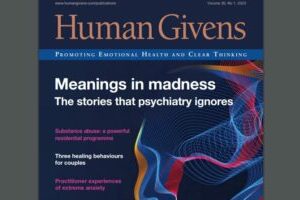From Human data: “John Read tells Denise Winn about his work showing adverse life events that explain most types of emotional distress and how the medical model ignores it.
LIGHT: . . . A large study found that 9095% of people with a [schizophrenia] ‘diagnoses’ do not believe, at least at the beginning of their treatment, that there is anything biologically wrong with them. This, unfortunately, is misrepresented by psychiatrists as a lack of insight which miraculously becomes a symptom of the disease, i.e. trying to explain to the psychiatrist that there is nothing biologically wrong with you. This is a very effective power play and a double bind you can’t get out of it. And if you fidget a lot, as a result, all the more it confirms that you are crazy.
WIN: I thought the lack of insight referred to people thinking that any hallucinations or delusions they may have were actually real.
LIGHT: This is a form of lack of insight, but overall it is a misuse of the term originally used by psychodynamic therapists. They used it to mean that someone was unaware of something that had happened in their life that was still affecting them, because they were repressing it. But psychiatry has co-opted it and one of the meanings now is that the person has no awareness of the fact that she is ill and needs treatment. One of the criteria for the psychiatric version of lack of insight is not agreeing to have medication, which is pretty amazing. Then they turn it into a real symptom of the disease, which is also strange. They call it anosognosia, which makes it sound like a real medical thing.
WIN: Apparently French neurologist Joseph Babinski created the term in 1914 to describe someone who had lost the ability to use or feel the left side of their body, but clearly it was expanded to include “schizophrenia” as well.
LIGHT: Surveys show that most people with a “diagnosed schizophrenia” think the voices they hear mean something about what’s going on in their lives, but aren’t usually asked to do so.
WIN: . . . even when it is accepted that circumstances may play a role in mental distress, the medical profession often speaks of a predisposition to vulnerability. In other words, they claim, it’s genetic. You would say otherwise.
LIGHT: Yes, because it is absolutely a mistake. In the 1970s, the stress vulnerability model was invented. It’s in every textbook, taught to every mental health professional, that you inherit a predisposition to various things, and the strength of that predisposition determines how much stress it takes to push yourself over the edge in whatever diagnosis you find yourself with. What biological psychiatry never tells people, and what they’ve probably forgotten, is that the original model was very clear that predisposition could be based on trauma.
Researchers have included the trauma itself as a predisposition to subsequent trauma and stress, pushing someone over the cliff. And this is absolutely obvious. If, say, you were physically abused as a child, you will be more sensitive and more damaged by the physical abuse later on. So both aspects of the stress vulnerability model can be based on adversity or trauma, to use their word. You don’t need a genetic predisposition.
Moreover, they did not find these genetic predispositions! They’re still there, after 50 or 60 years, saying, “Please give us another 50 million and we’ll find it one day.” Genetic research has gone nowhere. Researchers have stopped looking for specific depression or schizophrenia genes and are now looking for combinations of hundreds of genes. It’s a huge waste of money. I was at a conference with my colleague Professor Richard Bentall, arguably our best clinical psychology researcher, when he asked geneticists: “Can you identify a single patient who has ever benefited in any way from your research?” And there was silence.”
Item

***
Back to Around the Web
#Lack #intuition #history #psychiatry
Image Source : www.madinamerica.com